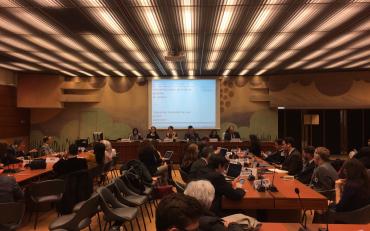Towards the Full Realization of the Rights of Women and Girls with Disabilities.
March 8, From 1pm to 2:30pm Room XXIV Palais de Nations, Geneva.
The event was co-organised by the Government of Spain, the International Disability Alliance, the Permanent Mission of New Zealand and UNFPA.
Moderator of the discussion was HE. Mr. Ambassador Cristóbal González-Aller, Permanent Representative of Spain to the UN Office and other International Organizations based in Geneva. Panellists were: HE. Ms. Ambassador Jillian Dempster, Permanent Representative of New Zealand to the UN Office and other International Organizations based in Geneva; Ms. Catalina Devandas Aguilar, Special Rapporteur on the Rights of Persons with Disabilities; Ms. Ana Peláez Narváez, Vice President of CERMI and Vice President of the European Disability Forum; Mr. Luis Mora, Chief of the Gender, Human Rights and Culture Branch at the Technical Division of United Nations Population Fund – UNFPA; Ms. Silvia Quan, IDA’s Senior Human Rights Advisor for the Treaty Bodies Unit.
The event had the aim of studying the most serious and most frequent violations, including violence, against women with disabilities, identifying the barriers that exist for the realisation of the human rights of women and girls with disabilities, as well as proposing actions that both the Human Rights Council, its mechanisms and Treaty Bodies (CEDAW / CRPD) can do to help the Member States to fulfil their international obligations in this regard. Moreover, another goal of the event was to review projects, initiatives, both of International Organizations, and civil society organizations, as well as of States that may constitute good practices.
In his opening remarks, the HE. Mr. Ambassador Cristóbal González-Aller, noted that in the area of gender and disabilities, there are issues that remain unaddressed. For this reason, he called the audience to refer to existing documents like the report of the Special Rapporteur on the Rights of Persons with Disabilities on women and girls with disabilities, in order to better continue our conversation and to achieve concrete outcomes on this matter.
HE. Ms. Ambassador Jillian Dempster,Permanent Representative of New Zealand to the UN Office and other International Organizations based in Geneva, showcased the situation of New Zealand and recognised the Washington Group short set of questions as pivotal to understand the real situation of women and girls with disabilities.
Ms. Catalina Devandas Aguilar, Special Rapporteur on the Rights of Persons with Disabilities, took the occasion to remind that practises like forced sterilisation and involuntary termination of pregnancy should be eradicated and that States should undertake all measures to eliminate discriminatory laws and policies that are undermining the fundamental right of girls and young women with disabilities to enjoy their sexual and reproductive rights. Ms. Devandas also noted that women and girls with disabilities often lack access to information on health and sexual rights because of their isolation. In this regards, inclusive education can play an important role to make sure that they access the same information as all other children and youth, so that they can feel free to create their own sexual identity and exercise choice and have control over their own bodies.
Ms. Ana Peláez Narváez,Vice President of CERMI and Vice President of the European Disability Forum and former member of the CRPD Committee, stressed the fact that even though we have advanced so much on the rights of persons with disabilities and on gender, we need to work together with different stakeholders in order to make the voice of 600million women with disability in the world be heard.
Ms. Silvia Quan,IDA’s Senior Human Rights Advisor for the Treaty Bodies Unit, reiterated the importance of intersection between gender and disability. She stated that we have now, with Ms. Ana Peláez Narváez running for CEDAW Committee elections, the occasion to have for the first time a woman with disability represented and encouraged States not to lose this opportunity.

